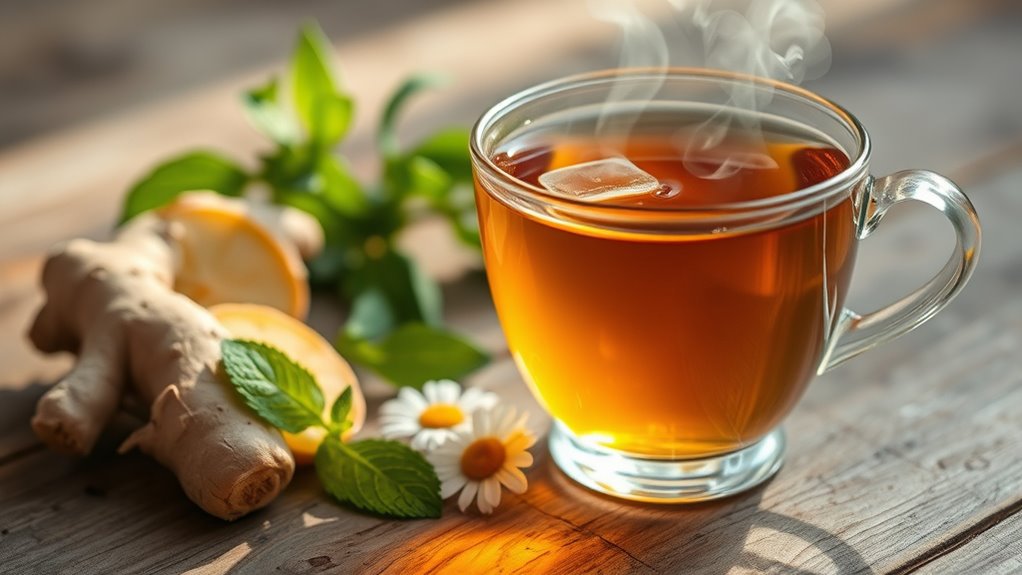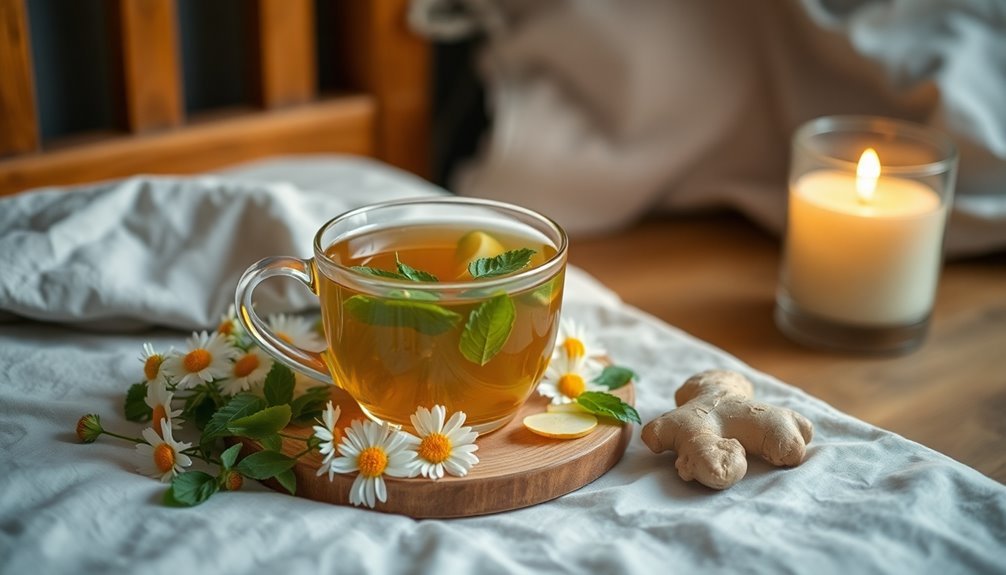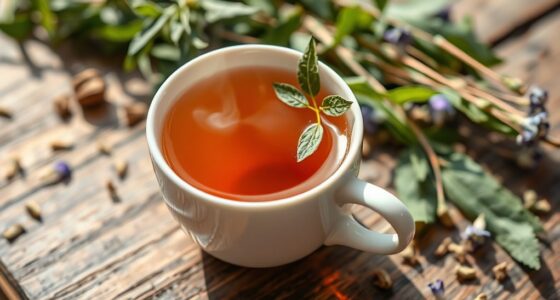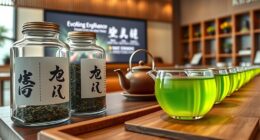Research suggests that herbal teas like peppermint, chamomile, and ginger can help soothe IBS symptoms by relaxing gut muscles, reducing inflammation, and easing nausea. These caffeine-free options are often better tolerated and can be enjoyed regularly to promote digestive comfort. Proper brewing techniques enhance their benefits. If you’d like to discover which teas could work best for your symptoms and how to incorporate them safely, there’s more to explore below.
Key Takeaways
- Herbal teas like peppermint, chamomile, and ginger have been shown to soothe irritated intestines and reduce IBS symptoms.
- Caffeine-free herbal teas are preferable, as caffeine can stimulate the gut and worsen IBS symptoms.
- Proper brewing of herbal teas enhances their digestive soothing properties and minimizes potential irritants.
- Individual responses vary; starting with small amounts helps identify which herbal teas best support gut comfort.
- Scientific research supports herbal teas as a natural, safe addition to IBS symptom management when used appropriately.

Herbal benefits vary depending on the type of tea you select. For instance, peppermint tea is well-known for its antispasmodic properties, which can relax the muscles of your gastrointestinal tract, easing cramping and bloating. Chamomile is another popular choice, often praised for its anti-inflammatory and calming effects, which may help reduce gut inflammation and promote relaxation. Ginger tea is celebrated for its ability to support digestion and combat nausea, making it a good option for those experiencing nausea or indigestion alongside IBS symptoms. These herbal benefits aren’t just anecdotal; research suggests that these herbs contain compounds that can soothe irritated intestines and improve overall digestive comfort. Additionally, choosing teas with proper brewing techniques can maximize their soothing properties and reduce potential irritants in your beverage.
On the other hand, it’s important to weigh caffeine effects when choosing your teas. Many traditional teas like black, green, or white tea contain caffeine, which can exacerbate IBS symptoms for some individuals. Caffeine can stimulate the intestines, leading to increased urgency or diarrhea, especially in those with sensitive guts. Even decaffeinated versions of these teas may contain residual caffeine or other compounds that might irritate your digestive system. That’s why herbal teas are often the preferred choice—they’re naturally caffeine-free, reducing the risk of triggering symptoms and allowing you to enjoy a warm beverage without worry.
While herbal teas are generally safe and beneficial, it’s wise to pay attention to how your body reacts to different herbs. Some herbs may interact with medications or cause allergic reactions in certain people. Always start with small amounts and observe how your gut responds. Incorporate a variety of herbal teas like peppermint, chamomile, and ginger into your routine to see which ones work best for you. Remember, the goal is to find teas that not only soothe your gut but also don’t interfere with your overall health or medication plan. With mindful selection, herbal teas can become a comforting, effective part of managing your IBS symptoms.
Frequently Asked Questions
Can Tea Consumption Worsen IBS Symptoms?
Tea consumption can sometimes worsen IBS symptoms, especially if you’re sensitive to certain compounds. While tea antioxidants are generally beneficial, they may irritate your gut if consumed in excess or if you have a specific intolerance. Tea can also influence your gut microbiota, potentially leading to increased bloating or discomfort. Pay attention to how your body reacts, and opt for mild, gut-friendly teas to help manage your symptoms.
Are Herbal Teas Safe for Long-Term IBS Management?
Imagine sipping a warm cup of herbal tea, feeling calm and comforted. Herbal tea benefits include soothing your digestive system, but you might wonder about long-term safety. Generally, herbal teas are safe for long-term IBS management when you choose varieties known for gentle effects. Always check ingredients and consult your healthcare provider to guarantee they align with your health needs, making your tea time both enjoyable and safe over time.
How Much Tea Is Recommended for IBS Relief?
For IBS relief, you should start with small amounts of herbal teas, around 1-2 cups daily, to see how your body reacts. Herbal benefits can soothe your gut, but be cautious with tea caffeine, as it might trigger symptoms. Stick to caffeine-free herbal options like chamomile or peppermint, and avoid overdoing it. Listen to your body to find the right balance that eases your IBS symptoms.
Do Caffeine Levels Affect IBS Symptoms?
Caffeine sensitivity can profoundly impact your IBS symptoms, as high caffeine levels often trigger digestive issues. Tea antioxidants, on the other hand, may help soothe your gut, but if you’re sensitive to caffeine, you might want to limit your intake. Choosing decaffeinated or herbal teas can reduce discomfort. Pay attention to your body’s reactions, as managing caffeine levels is key to controlling IBS symptoms effectively.
Can Tea Interact With IBS Medications?
Imagine tea as a delicate dance partner, each step representing tea preparation and ingredient interactions. When you drink tea, it can interact with IBS medications, either enhancing or hindering their effects. Certain herbal teas may contain compounds that interfere with medication absorption or efficacy. Always check how tea ingredients and preparation methods might interact with your meds, and consult your healthcare provider to keep your gut harmony intact.
Conclusion
So, next time your gut throws a tantrum, skip the drama and sip some of these “miracle” teas. Who knew that a simple cup could tame your rebellious intestines — or at least pretend to? Remember, science might be on your side, but don’t forget: no tea can replace a good diet or a sense of humor. Cheers to a calmer gut and keeping those IBS cramps at bay, one sip at a time!










